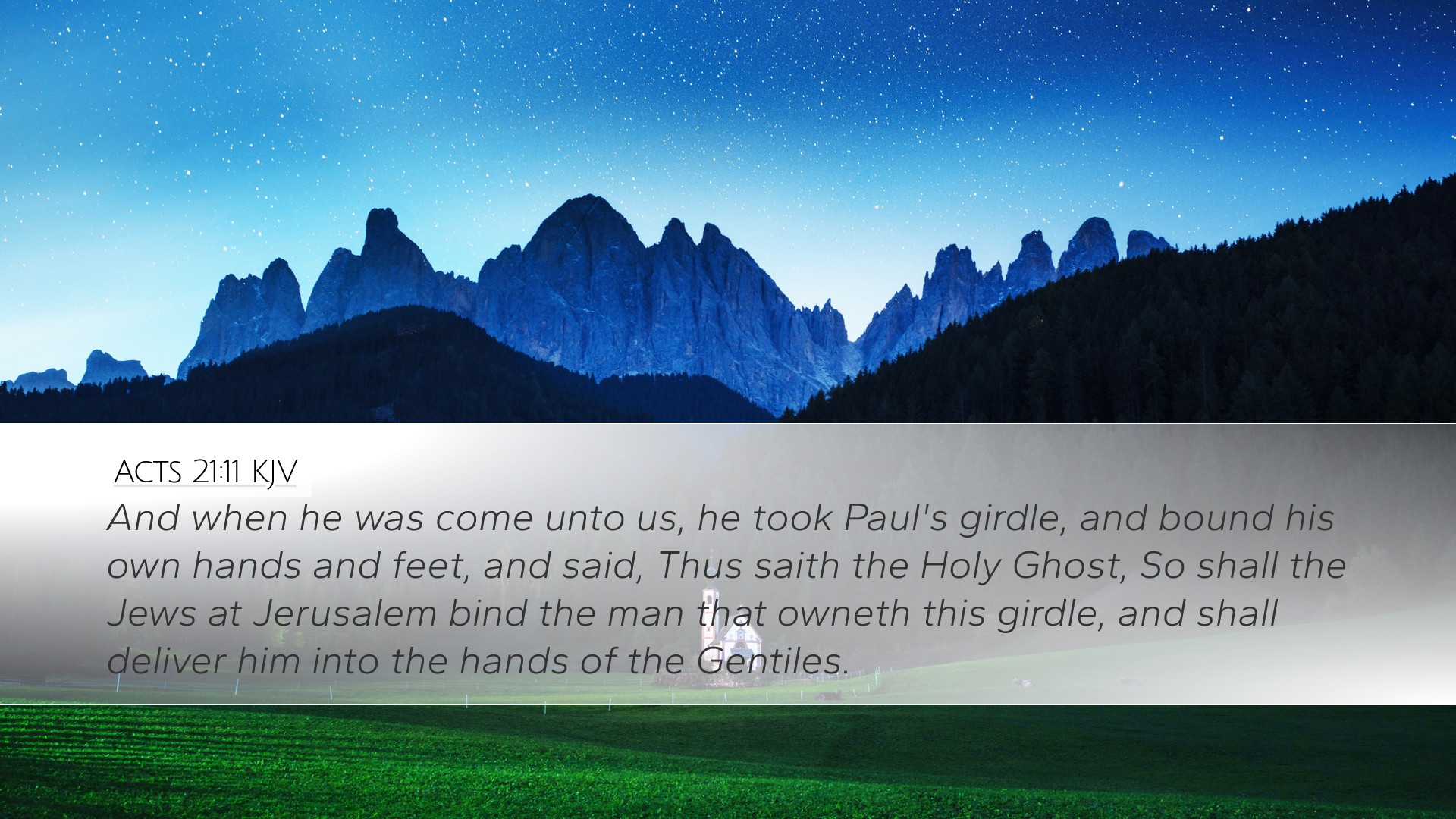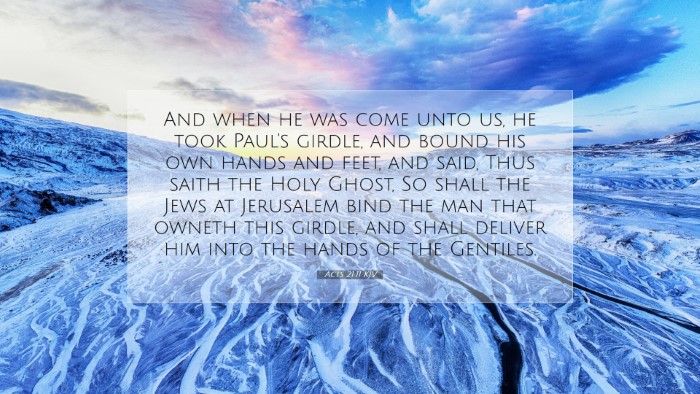Commentary on Acts 21:11
Acts 21:11 reads: "And coming to us, he took Paul's girdle, and bound his own hands and feet, and said, Thus saith the Holy Ghost, So shall the Jews at Jerusalem bind the man that owneth this girdle, and shall deliver him into the hands of the Gentiles."
This verse presents a vivid and poignant moment in Paul's journey to Jerusalem, illustrating prophetic warnings about the fate that awaits him. It captures the themes of prophecy, personal sacrifice, and the struggle between divine leading and human concern.
Historical Context
The narrative context is crucial. Paul, having been advised by multiple sources, including fellow believers and prophetic individuals, felt an overwhelming conviction to travel to Jerusalem despite the clear warnings of impending danger. The significance of this journey cannot be overstated, as it represents both a physical journey to a city rife with religious complexity and a spiritual journey towards suffering for the sake of the Gospel.
Analysis of the Prophet's Actions
The act of binding with Paul's girdle serves as a powerful symbol. Albert Barnes comments on how the girdle, a significant item in ancient dress, represents both the identity of Paul as a servant of Christ and the imminent suffering he would endure. The physical act of binding foretells the spiritual and physical bind that Paul would face from the Jewish authorities.
The Role of Prophecy
Matthew Henry emphasizes the prophetic nature of this confrontation. The prophet Agabus, in his dramatic portrayal, not only relays a message from the Holy Spirit but encapsulates the core of prophetic ministry: to warn, prepare, and inform. Acts 21:11 should be understood within the broader tradition of biblical prophecy that warns of upcoming trials, as seen in the Old Testament.
The Symbolism of Binding
Adam Clarke provides insight into the symbolism of binding. He notes that being bound not only indicates physical confinement but serves as a spiritual metaphor for the obligations that come with following Christ. Every believer is called to consider the potential personal costs of discipleship.
Divine Direction vs. Human Emotion
This verse also brings to light the tension between divine direction and human emotion. Despite the warning, Paul remains steadfast in his resolve to continue to Jerusalem, showcasing his commitment to the mission of Christ. This is an important lesson for pastors and leaders who often face similar crossroads where divine calling may conflict with the emotional pleas of loved ones and friends.
- Constant Prayer: The need for continuous prayer and discernment amidst potentially dangerous paths.
- Awareness of God’s Will: The importance of recognizing and adhering to God’s will, even when hardships are foreseen.
- Support from the Community: The role of the Christian community in both encouragement and warning.
Theological Implications
Acts 21:11 reveals several profound theological implications. First, it invites reflection on the nature of divine foreknowledge as revealed through prophecy. The impending suffering foretold does not indicate a lack of divine love but rather an integral part of the unfolding narrative of redemption.
Christological Reflection
Furthermore, there is a Christological dimension. Just as Christ faced suffering and hostility, Paul’s path mirrors that sacrifice, positioning him as a servant willing to bear the same tribulations for the name of Jesus. This connection is vital, as it shows the continuity of Christ’s mission through His apostles.
Ecclesiological Consideration
From an ecclesiological perspective, the binding serves as a metaphor implemented within Christian communities where believers must often reconcile their understanding of God's will with the outcry for communal safety and well-being. The church is tasked with navigating these moments of personal conviction against broader concerns.
Concluding Thoughts
In summary, Acts 21:11 serves as a rich text that intertwines the prophetic, the personal, and the ecclesial. It invites believers to consider the real implications of following Christ amidst potential trials. Pastors and theologians are encouraged to reflect deeply on this passage as it not only addresses the historical narrative of Paul but also speaks to the contemporary church's call to faithfully follow God's direction, even when it leads through challenging passages.
The insights drawn from Adam Clarke, Matthew Henry, and Albert Barnes collectively underscore the need for vigilance in prayer, the importance of prophetic voices, and the willingness to embrace difficult paths because of love for Christ and His mission.


